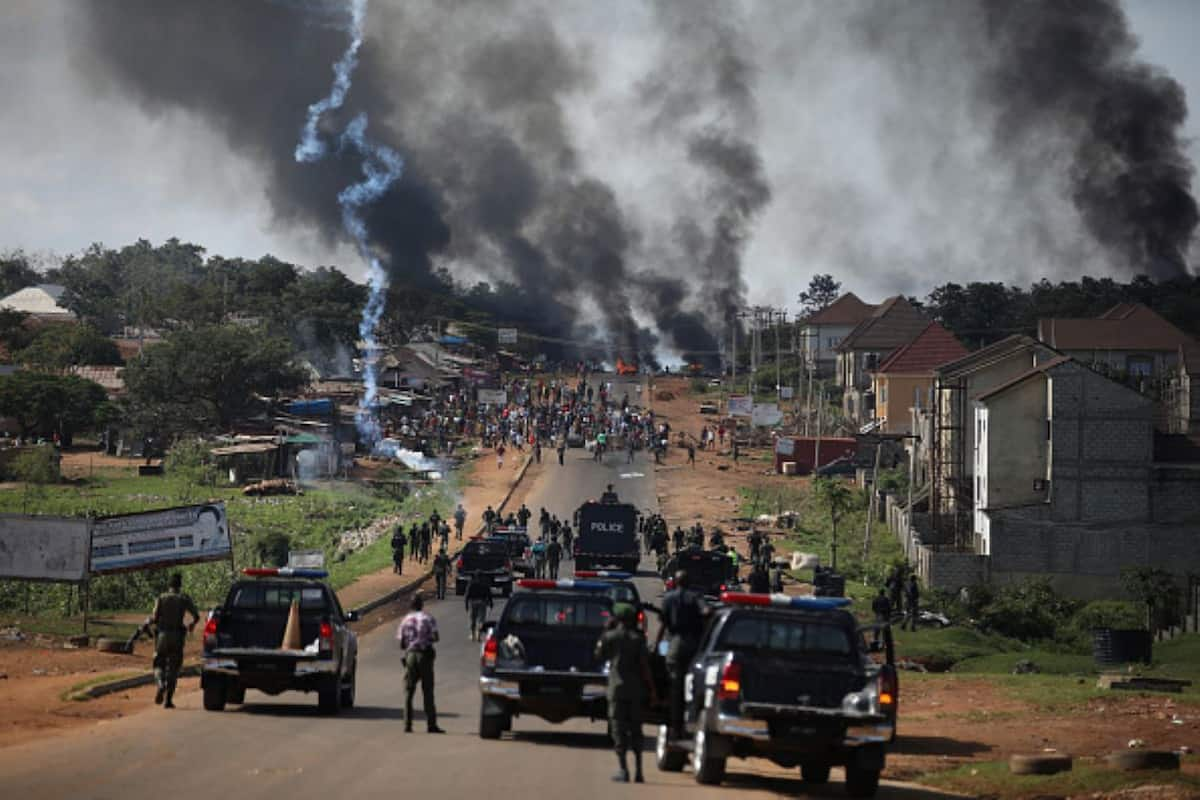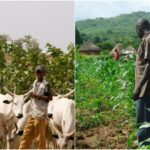It is the last week of the year when families across the world gather to celebrate Christmas and be with each other in merriment and feast. But in Plateau State, yet again, it is a season painted in brushstrokes of blood.
On Christmas Eve, terrorists, criminals, or the ubiquitous “gunmen,” as the media love to call them, invaded some 17 villages and killed with uncommon brutality, maimed with unrestrained malice, unleashed carnage, burning down houses and displacing thousands of families. In the end, some 150, 140, or 115 people (no one seems sure yet) have been killed.
This has been the 22nd year that such barbarism has become habitual in Plateau State. Across Nigeria, such stone-age internecine massacres of people in which “gunmen” would raid villages, not only in Plateau State but in Katsina, Zamfara, and other places, kill dozens in one swoop and abduct dozens or hundreds have become routine.
It will be 2024 in the next few days and it is baffling that Nigeria, Africa’s largest economy and one of its strongest militaries, has become the bastion of communal savagery. Yet despite decades of these atrocities, what competencies have the government and its security apparatus developed to deal with the situation?
Days after the massacre, all the same rhetoric that failed to work in the last two decades has been playing out again. The confusion over casualty figures (is it 115 or 140?); the callousness not to bother identifying and documenting the victims, instead just reducing them to uncertain numbers, with no name and no story; the same reaction of shock from the state government, the same condemnation from the FG with the same orders and assurances we have heard a thousand times before: The perpetrators of this heinous crime will not go unpunished. If the words sound familiar, it is because you have heard the same or very similar from Buhari, Jonathan, Yar’adua, and Obasanjo, or from Dariye, Chris Alli, Botmang, Jang, Lalong, and now Mutfwang. Five different presidents, and six different governors, yet the same rhetoric and reactions, the same words and strategies. The same outcome—the habitual massacres of civilians in their homes and the complete absence of justice or deterrent. The perpetrators of these “heinous crimes” have been going unpunished for decades. Not one person has been arrested and successfully prosecuted.
In the last 20 years, billions have been expended on security operations in Plateau State alone. Most of that money has gone to “motivating the security personnel” in the state. The big henchmen of the security agencies get a cut, now and then, vehicles are purchased to help with patrols, allowances are paid to security personnel and the rest of the money disappears into the pockets of politicians and civil servants.
We have not seen these monies expended in training personnel on strategic methods to protect civilians and communities, investigate atrocities and crimes, trace and track the actual perpetrators and their sponsors, and bring them to justice. Security presence has come to mean military and police checkpoints on the highways but very little presence in villages.
Following these attacks on Christmas Eve, the security operatives have been ordered to pursue the perpetrators. Are they being pursued? How does an army of terrorists who attack 17 villages in one night, kill hundreds of people, disappear like that? How do we continue to allow them to disappear like this?
Billions were spent, all for cosmetic interventions that have yielded no tangible results. There is often a declaration of a state of emergency; the deployment of the military who drive through towns with fierce scowls and big guns, who mount checkpoints that restrict more the movements of the victims than that of the criminals; the distribution of relief materials, which are often diverted by public officials to enrich themselves; and the showiest bit of the playbook, the establishment of a commission of inquiry, which is always an exercise in political verbal jousting. We ought to know by now that two decades of these superficial approaches have only benefited those who control the security allocations, creating corrupt big ‘ogas’, and setting the stage for the next big attack and big budget allocation.
To solve this problem, several things need to happen. First, we need to create a medium-term plan to jettison this militarist approach to community policing. Nigeria is not an occupied state and should not be treated by its own military as such. Nigeria must recruit and train competent police officers to respond to security threats, investigate them and such crimes, determine who is behind them, arrest them, and bring them to justice.
While community policing has been thrown around for some time, the idea has been countered by a genuine fear of its possible misuse by state executives in the suppression and subjugation of some ethnicities, tribes, or peoples.
How professional can these community police be to operate fairly and pursue the common good? Only in November, the Plateau State government inaugurated a 600-man strong state-owned security outfit called “Operation Rainbow.” Perhaps this attack should be chalked down as their first major failure and a wake-up call to the enormity of the task before them. While having locals watch over their communities seems like a reasonable approach because of their knowledge of the terrain, the training of these personnel has to be comprehensive, including physical, and psychological evaluations, and procedural competence. These calls have found elbow room because appeals for the federal police to expand and professionalise have been ignored. Hence, the police’s continued shirking of responsibilities that have led to the deployment of the military in places they have no business being in.
In countries like Norway, to be a policeman, one has to gain entry into the Norwegian Police University College and receive three years of university education for practical and theoretical foundation. Nigeria has resisted the demands of modern policing training even after promising police reforms in the wake of the 2020 #EndSARS protests.
Often, security personnel have aided in the crisis, mishandled it, or stoked its flame. In the 2010 crisis in Jos, the state police commissioner went on the radio and made inciting comments that worsened the conflict in the state, resulting in the deaths of hundreds of people. What was his punishment? A redeployment to Abuja, away from the storm and criticism, instead of being sanctioned for unprofessional conduct.
Secondly, there must be sincere efforts to build peace among the people in the state. One thing Governor Mutfwang said that I agree with is that peace is not the presence of security personnel but the absence of conflict. The seed of this conflict has been sown deep in the hearts of the people who live in the state, deep in its fertile soil, and for decades, that seed has been nurtured and watered for political gains. The undoing of this damage must be deliberate and sincere. Compromises would have to be made and justice and the rule of law must be firmly re-entrenched.
While we mourn, yet again, and say a prayer for the departed, questions must be asked. One thing I don’t quite understand is why Governor Mutfwang would claim that “terrorists” have occupied schools in several local governments for months, preventing school children from attending classes, and in the six months that he has been governor, no effort was made to reclaim these schools and dislodge these terrorists? I am mindful of the dangerous propensity of some politicians to deploy such terms on pariah communities in their domain because it is politically convenient to vilify them. But under what circumstances is it okay to allow people, terrorists or not, to dislodge students from their schools for months? If it is true that these were the terrorists behind these attacks and the governor has been aware of their menacing presence in these communities and did not cause their activities and movements to be investigated and appropriately nullified, then the question should be why?

 Join Daily Trust WhatsApp Community For Quick Access To News and Happenings Around You.
Join Daily Trust WhatsApp Community For Quick Access To News and Happenings Around You.


